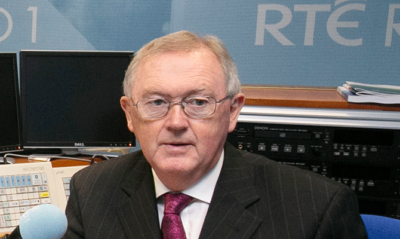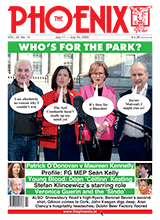
Sean O'Rourke
ONE OF the long unspoken fears in Irish political life is seeping into the daylight.
Retired RTÉ host Seán O’Rourke was on hand this week to launch the new book by Shane Ross, the former TD, senator and cabinet minister though above all a fellow journalist. To top off this cliché, the scene takes place where else but Doheny & Nesbitt’s public house and there could hardly be a better set up for the punchline to come.
O’Rourke took the opportunity to lament the difficulty encountered by Ross in compiling this biography, due to the reticence of Mary Lou McDonald and others. Another journalist, Aoife Moore, has said that she faces similar frustration, having already been commissioned by publishers, Sandycove, to write what has been promised as “the definitive book on Sinn Féin.” This behaviour amounts to “control freakery” in O’Rourke’s assessment and certainly Sinn Féin’s attitude to “loose talk” remains unchanged now for several decades.
There is an obvious commercial element in these complaints and a large part of the story here is the emergence of a market for this type of book.
As far back as 2011, hacks around Leinster House had begun to murmur about members of Sinn Féin or the technical group like Clare Daly keeping to themselves in the canteen. “Monastic” was one label applied to these new TDs by one of the more excitable journalists; a characterisation that makes sense inside a media bubble but falls down quickly where it counts, as many of these same representatives have held and grown their number in a decade since.
For their own part some of the new deputies, like Joan Collins, had winced at the deference and formalities of Dáil Éireann, as a culture far removed from the communities she had been elected to represent.
During this period, political correspondents had a job on their hands given that the previous election had just produced what was then the single largest turnover of seats in the state’s history, wiping out valuable sources in the process.
This nonetheless remained a marginal concern with SF seats then in the low teens, and, in any case, what appears in the newspapers is more often the product of “soundings” from a surprisingly small set of individuals drawn from an even narrower political outlook. The result has been that journalists as often as politicians have been bamboozled repeatedly by events throughout the ensuing decade.
Sinn Féin’s vote is now expected to lay waste to the next Dáil, putting McDonald at the heart of decision making. This poses a problem, professionally, if your contacts are largely drawn from other and soon to be opposition political parties. A dynamic that cuts both ways with few in the media, or elsewhere, interested in what a Labour Party on the fringes has to say.
Sinn Féin, a ‘movement’ that still maintains its own newspaper, is a difficult nut to crack, but the new dominant force in politics was also treated as irrelevant until very recently. The party would likely contend that the attention which followed has not exactly been conducive to harmonious relations.
On the other extreme of this equation, Seán O’Rourke could attest that there were no Sinn Féin members present at the infamous Oireachtas Golf Society event in 2020, an outing populated almost exclusively by Fianna Fáil, Fine Gael and zombie Progressive Democrats. Prominent among the diners were figures like Imelda Henry or Brian Hayes, two Fine Gael members who have swapped politics for lobbying. Our beloved banks in the case of Hayes, while Henry spent lockdown advocating on behalf of that other politically adjacent business, the vintners.
The enormous number of former politicians, party apparatchiks and even journalists currently turned lobbyist on behalf of industry groups or multinationals has been wearily documented in this magazine. One of the most recent and high profile examples is Ed Brophy, who, having moved seamlessly from Joan Burton to Paschal Donohoe, is now attempting to shape Irish and European public policy on behalf of plutocrat Jeff Bezos at Amazon.
The revolving door has generated unwelcome controversy for the government in recent years, eventually prompting amendments to the Lobbying Act tabled just before the last Dáil Summer recess.
This is a business based on access, relationships and the insider experience that comes with a connection to a government party. It follows then, that one’s value is diminished, professionally, if the other side gets in and especially so if this side happens to be your bitterest of rivals. Many of today’s high flying “consultants and comms professionals” have made opposition to Sinn Féin a point of pride, which leaves a sizable and influential constituency with a deep professional interest in the old parties retaining power.
The question obviously arises, parallel to political tension, as to how these figures might separate a professional interest from various concerns like newspaper columns, panel appearances, media hosting duties and so on. The other worry, of course, is that, as night follows day, we will see a rush of legislation favouring currently connected interests before the present administration exits the stage.
For this swollen cohort of “public affairs professionals’,’ staking their career over on the dark side, a Sinn Féin government may even make the humble if thankless job of journalism attractive once again.
It still remains, however, pessimistic in the extreme to believe that Sinn Féin will not be forced to open up and play ball significantly as part of its ever-accelerating respectability. The fact is no political party willingly shares anything that they do not want known. Often, it is the cover up rather than the crime that has sunk many political careers.
If there really is sincere concern about Sinn Féin’s secretive approach, are we to admit that the parties before them have not built a robust state with transparency and accountability at its core? Heaven forbid.




